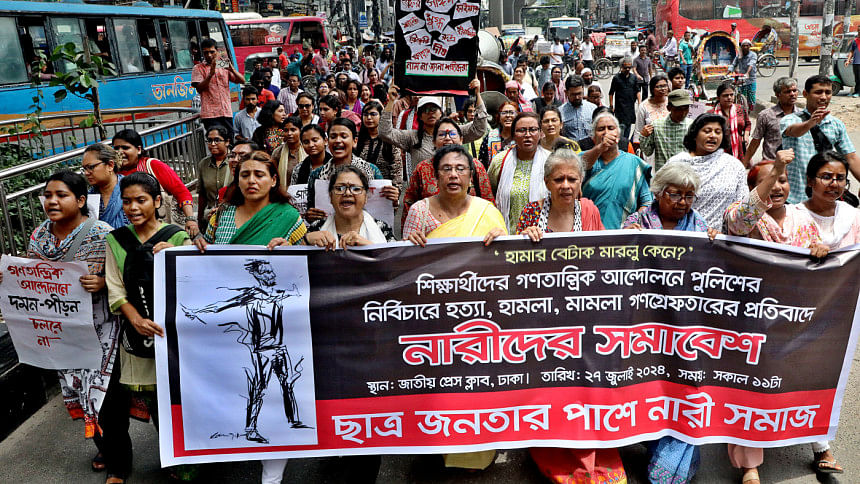July 27, 2024: Mass arrests and block raids fuel fear

City residents, still reeling from the trauma of deaths and destruction during the quota reform protests, felt a renewed wave of fear. Each day, particularly after sundown, convoys of vehicles carrying law enforcers reached neighbourhoods across Dhaka. Members of different security forces disembarked swiftly, cordoned off streets, and took positions at key points. With their left hands gripping the barrels and right index fingers resting on the triggers, they made their presence felt.
A loud announcement via megaphone reverberated through alleyways and buildings: "Go inside your home. Don't try to come out." Panic-stricken residents complied. What followed was a now-familiar routine—block raids. Internet connections at targeted homes were cut, and one by one streetlights went dark. The only illumination came from the searchlights mounted on the law enforcers' vehicles.
Residents from at least nine areas—Matuail, Shanir Akhra, Jatrabari, Kajla, Bashundhara, Shahinbagh, Mirpur DOHS, ECB Chattar, and Matikata—shared similar accounts. During these raids, police reportedly knocked on doors, entered homes, and detained individuals suspected of involvement in the protests or of having contact with alleged agitators. Joint forces were also deployed outside Dhaka as part of the ongoing nationwide operation.
In the 36 hours leading up to 6:00pm on July 27, law enforcers arrested at least 726 more people in Dhaka and other districts. In the 10 days prior to July 27, over 8,000 people had been arrested in 553 cases filed across 42 districts. Of them, 5,514 were detained outside the capital.
Two more people who had been injured in recent clashes died on July 27. Yeamin Chowdhury, a 19-year-old garment worker, succumbed to his injuries at Dhaka Medical College Hospital. Abdul Majeed, a 20-year-old transport worker, died at Chattogram Medical College Hospital. With their deaths, the official death toll stood at 162 since July 16.
Meanwhile, two more organisers of the quota reform movement—Sarjis Alam and Hasnat Abdullah—were taken into custody by the Detective Branch (DB). On the previous night, three other key organisers—Nahid Islam, Asif Mahmud, and Abu Baker Majumder—had also been detained.
Human Rights Forum Bangladesh (HRFB) condemned the arbitrary arrests and demanded the immediate release and protection of all detained students. The forum urged authorities to exercise the highest caution and ensure no student faced harassment.
In a joint letter to Foreign Minister Hasan Mahmud, 14 foreign missions—including those of the US, UK, France, Germany, Canada, and the EU—called for the protection of human rights and fair trials for those arrested. They expressed deep concern over the casualties and the destruction of public property during the protests.
Adding to international pressure, more than 140 scholars, writers, and public intellectuals from around the world urged the UN High Commissioner for Human Rights to press for an independent investigation into the brutal crackdown on students and protesters. In an open letter, they described the attacks as a violation of democratic rights and a mockery of the constitutional right to life.
At noon, women from various backgrounds gathered in Purana Paltan under the banner "Chhatra Janatar Pashey Nari Samaj." They demanded to know under what law the police fired bullets at students and civilians, and called for prime minister Sheikh Hasina's resignation. The protest condemned arbitrary killings, assaults, mass arrests, and the suppression of dissent.
Then-prime minister Sheikh Hasina visited the National Institute of Traumatology and Orthopaedic Rehabilitation (Nitor), where she blamed the violence on a conspiracy aimed at reducing Bangladesh to a nation of beggars by crippling its economy.
Awami League General Secretary Obaidul Quader, in a press statement, accused BNP of trying to form a "union of anti-state forces."
BNP Secretary General Mirza Fakhrul Islam Alamgir, in a statement, accused prime minister Hasina of shedding "crocodile tears" during her hospital visits. He condemned the detention of student leaders from hospitals and warned that such actions would only deepen the crisis. He called for the resignation of the government and accused it of clinging to power through repression, communication shutdowns, and curfews.
The government extended the daily curfew pause and adjusted office hours for three more days starting from July 28. Offices were to open from 9:00am.

 For all latest news, follow The Daily Star's Google News channel.
For all latest news, follow The Daily Star's Google News channel. 



Comments